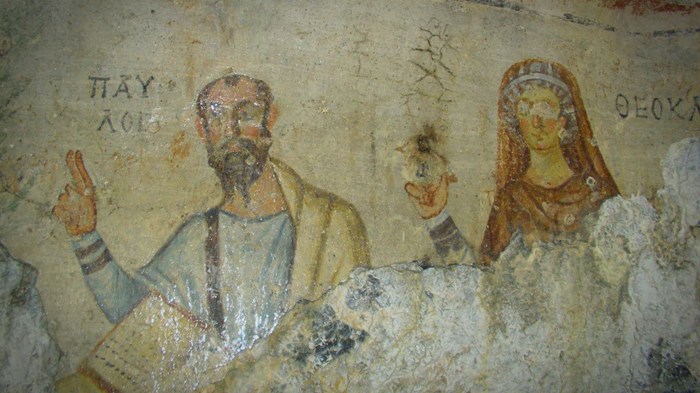
One of the (relatively few) criticisms we received regarding our current issue, Antony and the Desert Fathers, was that we slighted the contributions of women. The only woman featured in the issue is Macrina, founder of an all-female monastery, who has an entry in the Gallery. There are others we probably should have researched further, including Melania "the Elder" and her granddaughter Melania "the Younger," who both founded monasteries on the Mount of Olives. However, comparatively few women seem to have been significantly involved in early monasticism, and little is known about those who were.
A look at a woman named Thecla highlights the difficulty of reporting on early female monastics. Though she is mentioned by Cyprian, Eusebius, Augustine, Gregory of Nazianzus, Chrysostom, and other luminaries, the recorded details of her life are both sketchy and fantastic. The book that is pretty much the sole source of her story, the Acts of Paul and Thecla, was long ago dismissed as apocryphal, and its authorship has never been reliably established. Like other ancient "lives of the saints," it's an example of "history" written before demarcation between fact and fiction was deemed important—a fuzziness that, remarkably, is making a comeback (read that new Reagan bio yet?).
According to the Acts, Thecla was an 18-year-old betrothed virgin when Paul (yes, that Paul) came to preach in her hometown of Iconium. She could hear him preaching from inside her house, and she was so amazed at his message that she sat, "like a spider's web fastened to the window," for three days without food or water. Her mother entreated her to ignore the preacher, whose message included a strong call for celibacy, and return her affections to her betrothed, Thamyris. But Thecla, already converted by Paul's words, would hear none of it. In retaliation, Thamyris and other spurned men of the town conspired to have Paul imprisoned.
When the distraught Thecla visited Paul in prison, she too was accused of subversion and sentenced to be burned. However, God performed his first miracle on her behalf: while she was tied to the stake, the ground opened beneath her and rain poured from the sky, dousing the flame and killing several bystanders. Thecla fled, rejoined Paul, and journeyed with him to Antioch.
In Antioch, the pious virgin was assaulted by a local magistrate and shamefully kissed in public. For her anything-but-passive resistance, Thecla was once again sentenced to death—this time by being thrown to the beasts. However, God spared her twice more. During her first bout with the beasts, a she-lion (sensing some kind of sisterhood) merely licked her feet. During the second bout, the she-lion killed the much more aggressive he-lion, bears and bulls left the prisoner alone, and Thecla even found time to baptize herself in a pond filled with monsters, who promptly died and floated to the surface. In the melee, Thecla's patroness died and came back to life.
Assured of the truth of her message and the power of her God, Thecla spent several years traveling and teaching before settling into a cave. Like many monastics after her, she attracted a following by virtue of her wisdom, ability to perform miracles (healing, mostly), and admirable lifestyle. She survived one last assault on her virginity—by disappearing into a miraculous crevice in the rock of her cave—before finally dying at age 90 in roughly 85 A.D. She was greatly venerated in eastern and western churches, though never apparently in Rome; her feast day was suppressed by the Roman Catholic church in 1969.
Much to a historian's dismay, Thecla's story is less a biography than a fable extolling chastity. In fact, the extreme emphasis on celibacy in the Acts of Paul and Thecla is one of the reasons it has been discredited: perhaps it was a product of flesh-hating Gnostic, not orthodox Christian, tradition. Yet many Syrian Christians still visit her tomb in Maalula, asking for her help and preserving her memory, while the rest of us admit we'll probably never know who she really was.
* The full text of Acts of Paul and Thecla is available online in the Saint Pachomius Orthodox Library, www.fordham.edu/halsall/basis/thecla.html
* For more on Thecla and her contemporaries, see Christian History issue 17: Women in the Early Church
Elesha can be reached at cheditor@ChristianityToday.com.
Copyright © 2000 by the author or Christianity Today/Christian History magazine.
Click here for reprint information on Christian History.

Support Our Work
Subscribe to CT for less than $4.25/month




























